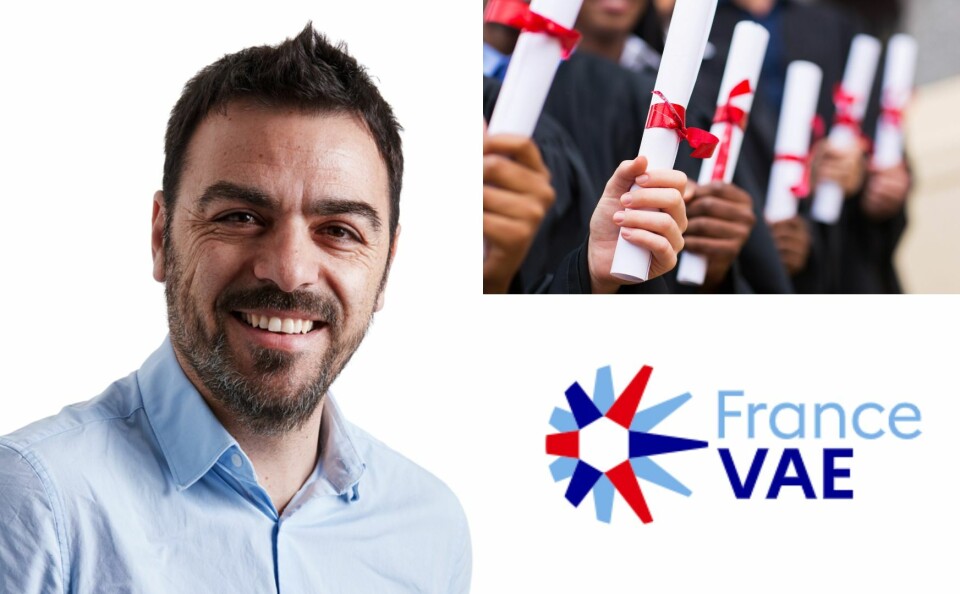-
Hosting scheme in south-west France lets you sample lifestyle before you move
Households in nine Dordogne communes volunteer under Mes Nouveaux Voisins scheme
-
How many Americans live in Paris - and where else are they choosing in France?
Over a quarter of all US nationals in France live in the capital city
-
Americans moving to France are increasingly choosing Nice
Expat numbers are soaring alongside a boom in US tourism in the city
‘I got a French master’s degree based on my professional experience’
A senior manager, originally from Italy, explains how he converted real-life experience into a recognised VAE qualification

After growing up in Italy and studying in Germany, Daniele Gentile, 47, moved to France in 2003. Now a senior manager for Dell Technologies, he explains how he converted his professional experience into a master’s in management.
It was around 15 years ago that I first heard about VAE, which stands for Validation des Acquis de l’Expérience (validation of acquired experience) – a French programme that transforms your real-life experience into a recognised qualification.
Back then, I did not pay much attention because, to be honest, I was not sure how useful it would be.
Then, in 2020, I met a marketing colleague at Dell Technologies who was very clear about the value of a VAE, so I decided to look into it.
Since Dell is a multinational company where initiatives like these are encouraged, it was relatively simple for me to contact the learning and development team and find other colleagues with experience of the VAE process.
Once I received the go-ahead from my company, I contacted the nearby Montpellier Business School to find out which level of qualification I could apply for.
We also talked about what to specialise in based on my academic background and career.
Read more: Will my UK physiotherapist’s degree be recognised for work in France?
Official credentials carry a lot of weight in France
I had studied economics in Italy, and then Germany within the Erasmus programme, where I also spent an extra year learning business administration applied to IT companies.
I started my career in IT in 1998, moved on to database development, and joined Dell in Montpellier in 2005.
A master’s was not required to move up the corporate ladder, but official credentials certainly carry a lot of weight in France.
Having lived here for nearly 20 years, I wanted my university education to be officially recognised and to validate my years of professional experience.
My master’s was part of the Grande Ecole programme
To begin the VAE, I chose three or four chapters based on my experience – for example, IT, sales, marketing or leadership – then I had to go back over my 17-year career, through archives, completed projects and old emails, gathering evidence of the work I had achieved and the knowledge and skills acquired.
My qualification was a master’s 2 in management as part of the Grande Ecole programme, so my final submission was 100 pages-plus, but for other qualifications it can be 20 pages.
You realise that you have spent years invested in moving forward without really considering how far you have come.
It is exciting and it gives a real boost to your self-confidence to take stock of what you have achieved.
Once you have gathered the information, it is submitted for evaluation.
If there are any gaps in your knowledge, you might get a partial validation and recommendation for a module or course to complete the qualification. Fortunately, I was awarded a full validation.
Read more: France ranks best in world for Master's degrees in finance
Going through the VAE process was deeply personal
Opting to pursue the VAE was also a very personal decision.
More than two decades ago, I left Italy to work abroad. It was an ambitious decision and one that involved a lot of risk, both for me and my parents.
It meant totally reinventing myself, with no history and education outside my native country, and I wanted to pay back my family for all the effort and trust they had put in me.
It might sound strange, but going through the VAE process felt very similar to deciding to apply for French citizenship.
I became a French citizen six years ago and it was an important step on a personal level as much as an administrative and legal one.
Getting validation for my professional experience was similarly of huge personal significance. It was another step towards deeper integration into the country that has been my adopted homeland for so many years.
The total cost was €6,000
One of the hardest aspects was probably understanding the involvement of a third-party agency, which is unclear in the beginning, and inevitably there is a fair bit of admin.
The agency assigned me a consultant to support and guide me through the process.
I was also lucky to have support at Dell Technologies. The total cost was about €6,000, roughly €2,500 of which was paid by my CPF professional training fund, and the rest by Dell.
Read more: Are freelancers entitled to France's professional training credits?
In terms of timing, I would say you need a minimum of six months to prepare, plus at least eight months to work on the validation.
That is provided you keep making a little progress every week: you need to be disciplined (especially as it is all done remotely) or it could take longer.
The right qualifications influence career progression in France
There are thousands of people who have already gained a huge amount of professional experience that has not necessarily been recognised with any kind of qualification.
A VAE is a great option if you are among that number.
I would say that if you have at least 10 years’ experience in your field, a VAE is a good route to get official recognition of your knowledge and skills.
Particularly in France, having the right qualifications can influence how you progress in your career.
In my experience, managers here can be more inclined to give promotions based on titles, unlike the prove-your-capabilities-first attitude of anglophone firms.
Salaried workers are not the only people who can benefit
The VAE process is open to everyone, whether they are salaried, freelance workers, jobseekers, volunteers or public officials, and regardless of age, current level of qualification or nationality.
All you must be able to do is justify a professional experience – paid or voluntary – lasting at least one year. It does not matter if this is continuous or not.
The costs can be covered by your professional training fund (CPF), your employer, or by public financiers such as Pôle Emploi or the regional council.
Registration and the interview (oral examination) with the board of examiners costs from €5,000. Additional interviews are approximately €1,300.
Stage one
The process consists of four stages. The first entails making contact with a VAE adviser to discuss your project, acquired knowledge, the level of qualification you can apply for, and potential financing.
Stage two
Stage two is a study of eligibility, where candidates explain how the competences acquired during their experiences could correspond with those set out in the qualification.
This dossier is accompanied by supporting documents and studied by the person in charge of teaching the qualification.
Notice of acceptance (or not) is within two months of receiving the file. Note that this stage alone will cost around €150, regardless of whether your application is successful.
Stage three
Stage three involves describing and analysing the skills and knowledge acquired in your professional and/or personal career, in relation to the skills needed for the chosen qualification.
You will also need to provide evidence of these achievements in your dossier.
Final stage
The final stage is a jury review of what you have submitted, as well as an oral examination.
Degrees obtained through the VAE system have the same value as those obtained by students following a traditional study route. Evaluation criteria and the level of expectations are identical.
You can find more information by visiting the French government portal.
Related articles
Explainer: what is France’s ‘talent’ visa and who can get one?
Why are French universities often allocated a number?
French training fund deemed success despite scams
























